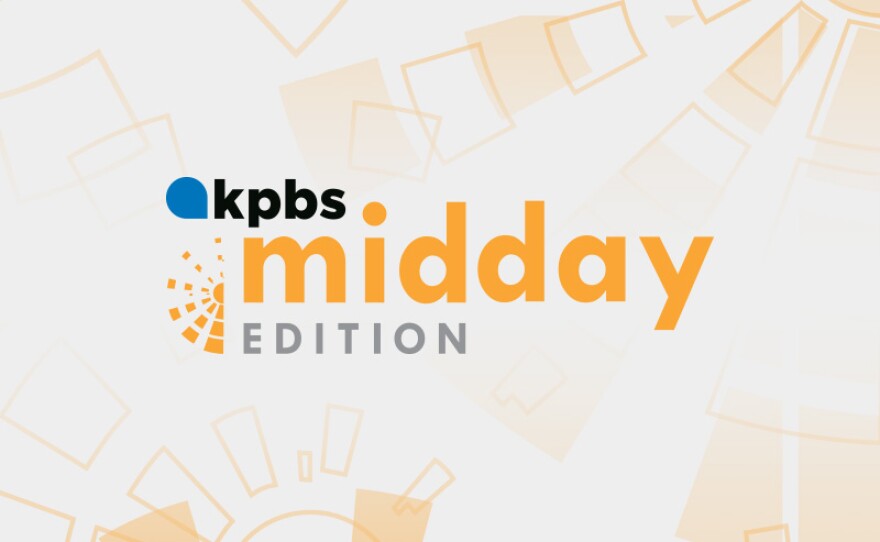Lambda Archives Stores San Diego's LGBTQ History
Speaker 1: 00:00 This weekend. The San Diego Pride Festival celebrates pride and respect for lesbian, gay, bisexual, and transgender communities here and across the world. KPBS reporter Claire [inaudible] found a local archive space that stores LGBTQ history, including artifacts of discrimination the community has overcome. Speaker 2: 00:20 This is the archives. We, this is our little mini exhibit area. Speaker 1: 00:24 Walter Meyer welcomes visitors to the lambda archives. Speaker 2: 00:28 We are the LGBTQ historical society of San Diego. Um, we collect, preserve, and teach the history of San Diego and imperial counties in northern Baja, California. Mexico Speaker 1: 00:40 Meyer is the manager of the archives, which officially opened its doors as a nonprofit back in 1987. Right away, visitors to the archives are greeted with a big variety of memorabilia from an all leather outfit worn by the singer Rob Helford, who lived in Hillcrest. Speaker 2: 00:58 If you're a Judas priest fan, you recognize the name. When he came out as gay, he took a lot of grief, Speaker 1: 01:04 four to a banner with a bright red heart in the words blood sisters. Speaker 2: 01:08 Let's just use, we're a group of lesbians who in the early days of aids stepped up to donate blood for their sick gay friends. Speaker 1: 01:14 In fact, there are many pieces of history at Lambda Archives that remind visitors about the aids crisis. For example, an artifact from Auntie Helen's, a store in north park that originally helped people with aids do their laundry. It was run by local activists, Gary [inaudible]. Speaker 2: 01:33 They found a notebook that they thought they have lost and it just a notebook in which you wrote the names, addresses, and phone numbers of people for whom he was doing their laundry, doing their grocery shopping, get your dog to the vet and almost every entry in there has in the right margin. A note with a death date pass to the Lord. Ten six 86 I'll love you forever, Gary. You know, next line, you know Bubba and just line after line. I think there's 138 names in there and about 110 of them have death dates. Speaker 1: 02:00 Meyer says something like that shows the history of the LGBTQ community much better than reading about it. In a book. Speaker 2: 02:07 It's mute testimony to the horrors of of the early days of aids and this poor man who is he himself is sick, is trying to take care of so many his friends and so many of their needs Speaker 1: 02:17 men. What Meijer really likes best. This is the actual archive actual artifacts from local LGBTQ history. Speaker 2: 02:27 We have banners, every dyke march, aids walk, et Cetera. We get the banners, we get the posters. Speaker 1: 02:32 That includes a stop Larouche banner from 1986 opposing proposition 64 a state ballot measure backed by Lyndon Larouche that some feared would have led to quarantines of people with AIDS. Speaker 2: 02:45 This was the no on 64 initiative, one of the many attempts to make life difficult for the LGBT community. Speaker 1: 02:54 They also have yard signs from LGBTQ political candidates like Christine, Kiko, Bonnie Demanis and Steve Petia plus old gay bar signs like a stain glass window from Baucus House in North Park Club that closed 10 years ago. Speaker 2: 03:11 You identified 168 gay bars that have come and gone at the peak was 1986 40 were open at once and then weather aids took its toll or just they hit saturation point like a neighborhood can only support so many dry cleaners until some of them have to go out of business. Uh, but we are now down to about 14, Speaker 1: 03:29 but while older libraries and archives often receive family heirlooms, like old photos or newspaper articles or books, Meyer said that hasn't happened much at lambda. Speaker 2: 03:40 And you can imagine that if, you know, John Smith died in this family came out from Wisconsin to look at his stuff and they found stuff like this that burn it. Speaker 1: 03:47 That's part of the challenge of running an LGBTQ archives when it comes to older photos and memorabilia. Meyer says there aren't that many Speaker 2: 03:57 because the world was so closeted back then. Um, we don't have a lot of really early stuff, right, of this eighties and nineties. Really, most people didn't want their picture taken in gay pride or taken in a gay bar. It could ruin your life. Speaker 1: 04:10 That's why it's important to store what they do have and items from more recent history to remind people in the future that LGBTQ discrimination wasn't that far in the past. Claire Triglyceride KPBS News, Speaker 3: 04:30 uh.


